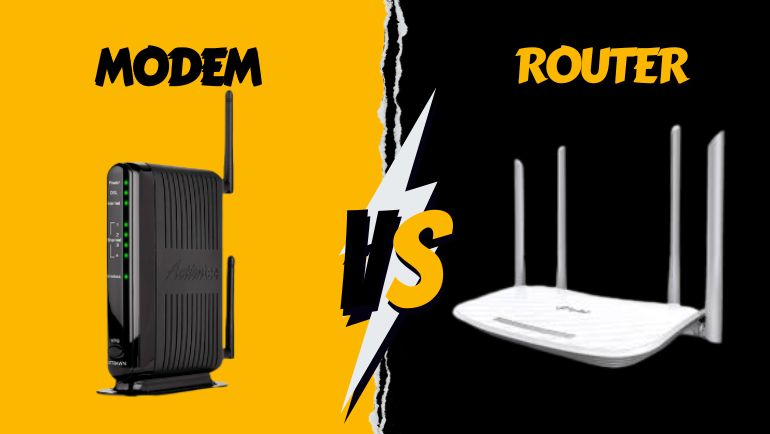
- Working
- Mode of Connection
- Speed
- Number of Ports
- Compatibility
- Security
- Wired or Wireless
- Area of Coverage
- Protocol
- Cost
The internet provides accessibility to information and opens new ways of optimizing the workflow. However, getting an internet connection can be frustrating and complicated due to the glaring options and confusing terms like modems and routers. We will explore the differences between modems vs. routers and help you understand how they provide internet access.
Difference Between Modem vs. Router: A Detailed Comparison
Modem means modulator and demodulator, while the router connects devices to the modem. The following section will cover the significant differences between modems vs. routers to help you understand the distinction.
Modem vs. Router: Working Principle
A modem works as a modulator and demodulator between the Internet Service Provider (ISP) and router. In contrast, a router creates a Local Area Network (LAN) to provide an internet connection for your devices. In simple terms, the router manages all the information, and the modem specifies its destination.
Modem vs. Router: Mode of Connection

The mode between router vs. modem varies with the connection type. The modem can be connected via DSL cable, Dial-up connection (obsolete), and TV cable line. However, the router connects to the modem via fiber optics or an ethernet cable, such as single mode, Cat5 & more.
Modem vs. Router: Speed
The upload and download speed of the modem determines the internet speed coming from the ISP. In contrast, the router’s speed determines the wireless data transfer rate within the LAN. Lower-quality routers do not limit your internet plan but provide poor user connectivity. On the other hand, inefficient modems cause bottlenecks and connection problems.
Modem vs. Router: Number of Ports
Different port configurations are available in routers, but modems only come in 4 ports, of which 1 or 2 may be USB ports.
Modem vs. Router: Compatibility
Several factors affect the compatibility between modem vs. router, such as ISP compatibility, same port type, and more. Usually, the ISP provides a list of compatible modems that support the speed and connection type. However, routers need to have the same port connection as a modem, like ethernet or coaxial.
Modem vs. Router: Security

Security features in routers protect your devices from hack attempts and safeguard data like firewall protection, network control, and more. In contrast, modems offer basic security features upon proper configuration, including Wi-Fi network AES encryption, secure administrative access, and more. It is important to note that these security features between modem and router vary from model to model.
Modem vs. Router: Wired or Wireless
The primary difference between Wi-Fi routers vs. modems is that the ISP connects to the modem only through a wired connection. In contrast, routers connect to a modem via an ethernet cable, but devices can be interconnected through Wi-Fi.
Modem vs. Router: Area of Coverage
Routers coverage range varies with the number of antennas and built quality. However, as a rule of thumb, most high-quality routers may cover an area of 150 feet indoors and 300 feet outdoors. In contrast, modems and some routers do not transmit wireless signals and, therefore, don’t have an area of coverage.
Modem vs. Router: Internet Protocol – IP address

Dynamic Host Configuration Protocol (DHCP) automatically assigns IP addresses to devices within the network in all routers and some modems. Specifically, routers perform Network Address Translation (NAT) between private and public IP addresses provided by the ISP. This allows internet access on a single public IP address, enhancing networking device security.
Modem vs. Router: Cost
Opting for a separate router and modem provides you with a secure and stable internet connection but increases the cost significantly. Therefore, evaluating the needs and connection requirements is essential before buying a router or modem.
Modem vs. Router: Which One to Choose?
The best modem & router are the ones that align with your requirements and budget. As it must have been understood till now, for internet accessibility, modems need routers and vice versa. Therefore, there isn’t any choice between the two; buying both is the best option. Enterprises with fewer customization can also equip themselves with a modem router combo or gateway for one complete package. Computing Worlds offers a wide range of modems and wireless routers for sale, some of them are listed below:
Modems
Routers
- F9K1001 Belkin Wireless Router
- AER1650LP4 CradlePoint Wireless Router
- XR500-100EUS Netgear Nighthawk Wireless Router
You can also request a bulk quote online for the required wireless router devices.
Frequently Ask Questions:
Do I need a router if I have a modem?
Yes, the router creates a Local Area Network (LAN) needed to connect devices to your Internet Service Provider (ISP).
What is the complete form of the modem?
Modem refers to modulator-demodulator.
Is modem & WiFi the same?
No, modems have a physical connection with the ISP, while Wi-Fi transmits signals for an internet connection.
In conclusion, both routers and modems are important for internet connectivity. As router creates LAN, while the modem connects to the ISP provides and translates it. However, selecting one requires careful evaluation of the requirements and compatibility. Enterprises opt also opt for Wi-Fi extenders or mesh routers to extend the wireless signals. However, you can also convert your old router into an extender as well. Moreover, both modem and router have WPA encryption, but data-sensitive enterprises secure their router by adding an extra layer of security. This marks the end of the differences between modem vs. router.
For more such information, stay connected to the Computing Worlds blog.






